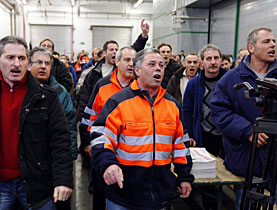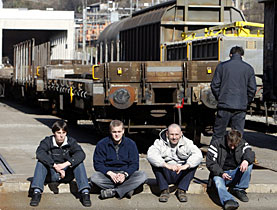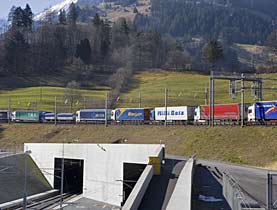Protests greet rail cargo job cuts announcement

The announcement by the cargo division of Swiss Federal Railways that it's cutting more than 400 jobs has triggered a wave of protests.
The cuts – which will affect depots cross the country – come after the freight operation suffered a loss of SFr190 million ($185 million) last year.
Workers at one of the four affected sites immediately went on strike and are planning demonstrations on Saturday.
The state-owned company – with a workforce of more than 4,400 –said it would relocate a further 200 jobs, mainly to the western town of Yverdon.
“Our decision is well thought out and necessary,” Thierry Lalive d’Epinay, chairman of the board of the Federal Railways, said on Friday.
The aim is to cut spending by SFr70 million annually in an effort to lift the unit out of the red. The cargo division has repeatedly posted deficits and changed top management since a major reorganisation eight years ago.
The measures, proposed by a task force set up by the board of directors last year, are due to take effect next year.
The administrative headquarters of the cargo division in Basel is likely to be hardest hit, while 126 jobs will go at the locomotive repair facility in the southern town of Bellinzona.
The sites at Fribourg and Biel are also set to lose jobs.
Angry reaction
The main railway workers union called on management to reconsider its decision and announced a series of protests.
It criticised the board of the Federal Railways for neglecting its duties and came out in support of workers in Bellinzona who have begun a strike.
Politicians from the Ticino region, including Bellinzona, are calling for talks with Transport Minister Moritz Leuenberger and for a fair solution taking account of regional interests.
Other cantonal and local authorities expressed their disappointment and urged the government to provide financial support for those affected by the latest restructuring of the cargo unit.
The federal government said the job cuts were unfortunate, but the cargo division had to act quickly to shore up its financial situation. The government spokesman said the collective labour agreement should ensure that no layoffs occur.
For its part the Road Hauliers’ Association demanded a partial privatisation of the cargo division in a bid to remain competitive in the long run – a proposal rejected by Federal Railways.
Pushed by the market
Cargo boss Nicolas Perrin argued that regional interests should not influence company strategy. He said that the move was in the best interests of the company.
“Swiss Federal Railways Cargo is an business enterprise,” he said. “We cannot make our decisions based on regional politics.”
Market forces and international competition have put a strain on the Federal Railways over the past few years. Management had been contemplating reducing the cargo division since 2006.
Moves are also underway to make transportation by truck a less attractive alternative to rail.
A comprehensive SFr5.9 billion renovation of the country’s rail network is in the works and authorities have plans to sharply increase fees for truck traffic.
swissinfo with agencies
Swiss Federal Railways Cargo is Switzerland’s leading provider of freight services.
It has a workforce of about 4,400 and generated 12.3 billion net tonne-km of traffic last year.
The lion’s share of cargo traffic is transalpine freight on the north-south axis through Switzerland.
The cargo division was launched as a business unit in 2000 and has been plagued with deficits and restructuring.
Last year, the company posted a deficit of SFr190.4 million, as its international subsidiaries in Germany and France suffered major losses.
Trucks have taken a bite out of the Swiss rail cargo industry as of late, but this is likely to change.
Authorities are calling for most goods to be taken off the road and put on trains.
The number of heavy goods vehicles crossing through Switzerland is supposed to drop to 650,000 by 2009 (1.2 million in 2005), although the target that is unlikely to be met.

In compliance with the JTI standards
More: SWI swissinfo.ch certified by the Journalism Trust Initiative



You can find an overview of ongoing debates with our journalists here . Please join us!
If you want to start a conversation about a topic raised in this article or want to report factual errors, email us at english@swissinfo.ch.